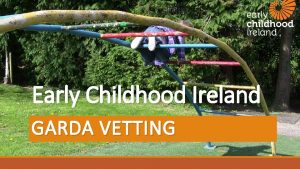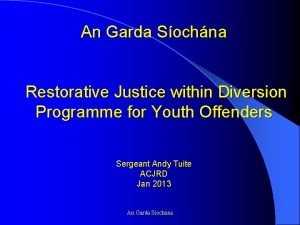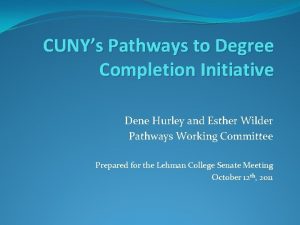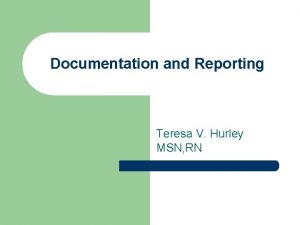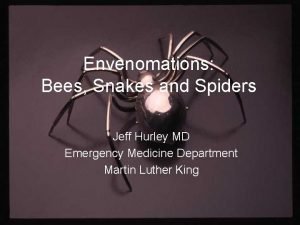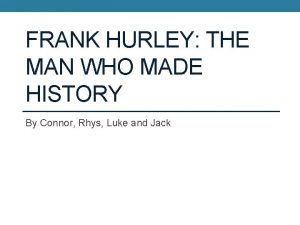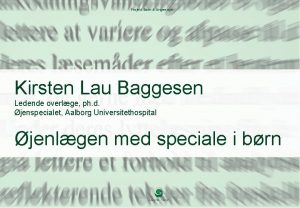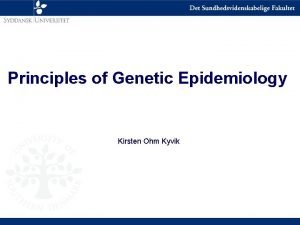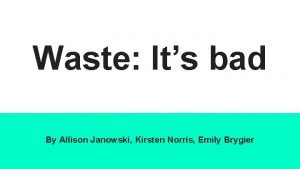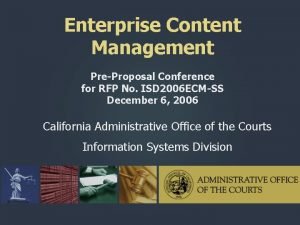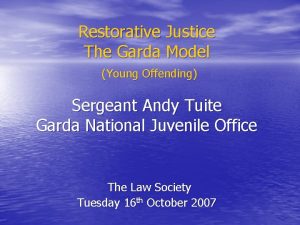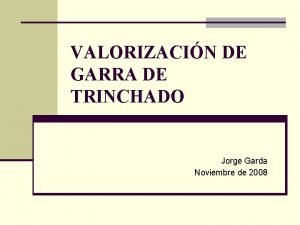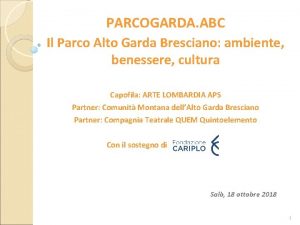Garda Conference Who Are we Kirsten Hurley Kirsten






































- Slides: 38

Garda Conference


Who Are we!? Kirsten Hurley • Kirsten Hurley is a co-ordinator of the online course on autism studies in UCC • She is a co-founding member of the Autism Course Board of Studies • She lectures on autism studies and is also the co-founder of ASC

Diarmuid Heffernan • Diarmuid Heffernan is a lecturer on Autism Studies classroom based and online courses • He is a co-founder of the autism course Board of Studies • Is co-author of Living with Asperger Syndrome and Autism in Ireland’ • Author of ‘Sensory Issues for Adults with Autism Spectrum Disorder’ • Co founder of ASC • Works with people with autism 1 -1 and in groups

Format of the workshop • What is ASD (or autism or Asperger’s for that matter)? • How does ASD affect a person? • ASD and girls • Discussion/Q&A!

Most of the literature on Autism Spectrum Disorders (ASDs) is written from the perspective of ‘experts’ (mainly in clinical professions) who do not have ASD.

What is ASD? • ASD stands for Autism Spectrum Disorder • Relatively new term (May 2013 – DSM 5) • ASD now covers Asperger’s syndrome (also known as AS) and ‘classic’ autism • 3 levels of severity (see handout)

So what is autism? - Autism (and the other ASDs) is a neurodevelopmental disorder - It is present from early childhood - Autism is clinically defined by impairments – often referred to as ‘the triad’

And what about Asperger’s? • Asperger syndrome (AS) is clinically differentiated form autism through lack of language and cognitive delay • Asperger Syndrome has now considered to be an Autism Spectrum Disorder (ASD) • Some people with AS claim it as part of their identity and do not see it as a ‘disorder’ at all

Autism Spectrum Conversation • What is the autism spectrum? • Wide variability in the presentation of autism • Fluctuation of symptom severity depending on the level of anxiety the person is feeling

A bit of history… • Leo Kanner and Hans Asperger both described what we now call ASD in the 1940 s • Autism was first included in the DSM III in 1980 • Lorna Wing coined the term Asperger’s syndrome in 1981 leading to the inclusion of AS in the DSM 4 in 1994

SO WHAT CAUSES ASD? • MMR vaccine (Dr Andrew Wakefield)? • Refridgerator mothers? • Environmental factors? • Genetics? MYTHS, THEORIES AND ‘FACTS’ • Prenatal environment? • An adaptation to the technological age we now live in? (Baron-Cohen, 2001)

The Triad of Impairments in Social Interaction -aloofness, not understanding social cues, lack of desire to communicate with others, difficulty with social imagination, difficulties with body language Impairments in Communication - verbal and non-verbal language problems, lack of recipriocal conversation, literalness Impairment in Imagination (flexibilty in thought and behaviour) - difficulties with imaginative play, lack of understanding of others’ perspectives, may have set routines, or limited interests, may have physical streotyped behaviour

Triad to Dyad (DSM 5) Social Interaction Social Communication RIBA & sensory issues Communication Repetitive Interests, Behaviours and Activities

Social Communication People with ASD may have difficulty with… • relating to other people (understanding their thoughts, emotions and motivations) • using verbal and nonverbal communication (gestures, body language, speech) • adjusting their behaviour to suit the social context

Problems with Social Recipricocity • Poor eye gaze/eye contact

RIBA and sensory issues People with ASD may have difficulty with… • Some environments that ‘seem fine’ to everyone else • Changing topic or task easily • Regulating time spent on interest of importance to them

Sensory Differences in ASD • Hyposensitive (under-sensitive) - will seek sensory stimuli • Hyper-sensitive (over-sensitive) – will avoid sensory stimuli A Solution? Sensory breaks!

People with ASD may… • Also experience mental health difficulties such as depression, anxiety and eating disorders • Have co-morbid conditions such as dyspraxia, dyscalculia, hypotonia, dysgraphia • Experience other difficulties associated with ASDs (such as weak central coherence and impaired executive function)

Weak Central Coherence People with ASD are often said to have ‘weak central coherence’ focusing on individual details but missing the ‘whole picture’ - however this can be an advantage (they can spot an error very quickly!)

H H HHHH H H H H

Executive function is what allows us to plan, organise and sequence. It also helps us to control automatic or what may be deemed inappropriate verbal or physical actions. Impaired Executive Function Executive function also means being able to adjust to something unexpected happening, multiitask, or pay attention to someone talking to us even if there is lots of background activity.

Girls with ASD - are often not diagnosed! - present differently to their male counterparts - struggle with social interactions (especially in large groups) - can be very vulnerable and naïve

There is no to be autistic or to support students with ASD!

Autism and the CJS • People with autism are more likely to be victims of crime than people who do not have autism (Beadle-Brown, 2014) • There are numerous reasons for this:

Reasons for AS person being a victim of crime • • • Naivety Not understanding social expectations Wanting to fit in Believing adults/superiors/people perceived to be in authority Obsessional interests Lack of understanding of implications in certain circumstances More likely to have mental health problems – more vulnerable Legacy issues i. e. bullying PTSD The confusion of online with ‘real’ world More likely to be victims of those who are known to them to due to smaller social circle

People with AS in CJS • Most people will need an advocate regardless of age

Custody • Prioritise the case at busy times • Remove from crowded or noisy areas • Ask if the person has sensory sensitivities • Avoid restraints if possible

Interviewing the Victim with AS • Normal police guidelines may be unhelpful a different approach is needed with autism • Remember every person with autism is different

Interviewing the victim with AS • Let the person know in advance every step of the process, who each person involved in the process is, rough time scales • Use literal language, e. g rather than asking ‘can you tell me what happened’ ask ‘tell me what happened’, ‘tell me in your own words’ • Avoid metaphor • Allow the person time to process the question • Do not raise voice become emotional • Use the persons name

Language and Echolalia • The person may not take turns in the conversation • May use echolalia – e. g asking ‘you did it didn’t you’ may get the response ‘I did it’ • People with AS may find it very difficult to concentrate on what the other person is saying – might be scripting or thinking about their own next sentence

Memory • People with AS usually have a good memory for facts and general personal memories • Usually have difficulty with specific experienced ‘episodic’ memories • Poor working memory especially if asked a long and detailed question • Ask questions like: What did you do between 1 -2 in the shop etc

The Cognitive Interview (Fisher & Geisleman, 1992) • Report everything • Context reinstatement (e. g of when event happened) • Think of it like following footsteps in the snow • The witness dictates the pace • Try not to interrupt

Interviewing do’s (Recap) • Use visuals, drawings, sketches, diagrams etc • Offer frequent breaks and time out if needed • Tailer language to the individual: • Start sentence with the persons name • Use clear simple language no metaphor • Avoid inference • Frequently check understanding/summarise answer

Interview don’t’s • Don’t try to stop repetitive behaviours – they may be a coping mechanism • Don’t take away comfort items • Don’t misinterpret echolalia or silence for insolence or evasion of questions • Don’t move too quickly – allow enough time to process questions and verbalise an answer

Autistic Vulnerability • Ensure people with AS are always treated as vulnerable

The autistic advantage • When interviewing someone with autism then the conversation needs to be an ‘autistic’ one – this can work to your advantage! • The person may make a fantastic witness with excellent and detailed recall

Discussion/Q&A
 Kirsten hurley
Kirsten hurley Insidan region jh
Insidan region jh Krones taicang
Krones taicang Magnifica patria
Magnifica patria Garda vetting form early childhood ireland
Garda vetting form early childhood ireland Jlo garda
Jlo garda Garda schools programme
Garda schools programme Garda cyber crime unit contact
Garda cyber crime unit contact Dene hurley
Dene hurley Kenneth hurley
Kenneth hurley Hurley phantom 120
Hurley phantom 120 Tape v hurley
Tape v hurley Siobhan hurley
Siobhan hurley Dr. jeffrey hurley
Dr. jeffrey hurley Frank hurley the man who made history
Frank hurley the man who made history Lynda hurley
Lynda hurley Hurley range
Hurley range Kirsten carr
Kirsten carr Kirsten pedd
Kirsten pedd Kirsten heide
Kirsten heide Hendrik kirsten
Hendrik kirsten Kirsten places her surveyor's telescope
Kirsten places her surveyor's telescope Kirsten wismer
Kirsten wismer Kirsten elger
Kirsten elger Kirsten bunney
Kirsten bunney Kirsten lau
Kirsten lau Kirsten ohm kyvik
Kirsten ohm kyvik Kirsten sandberg
Kirsten sandberg Allison janowski
Allison janowski Kirsten tollefson
Kirsten tollefson Forløbsmodellen
Forløbsmodellen Namd conference
Namd conference Enterprise content management conference
Enterprise content management conference National water quality monitoring council
National water quality monitoring council Nceta conference 2021
Nceta conference 2021 Why was the munich conference unsuccessful
Why was the munich conference unsuccessful Gxp
Gxp Cartoon yalta conference
Cartoon yalta conference Conference of european statisticians
Conference of european statisticians




